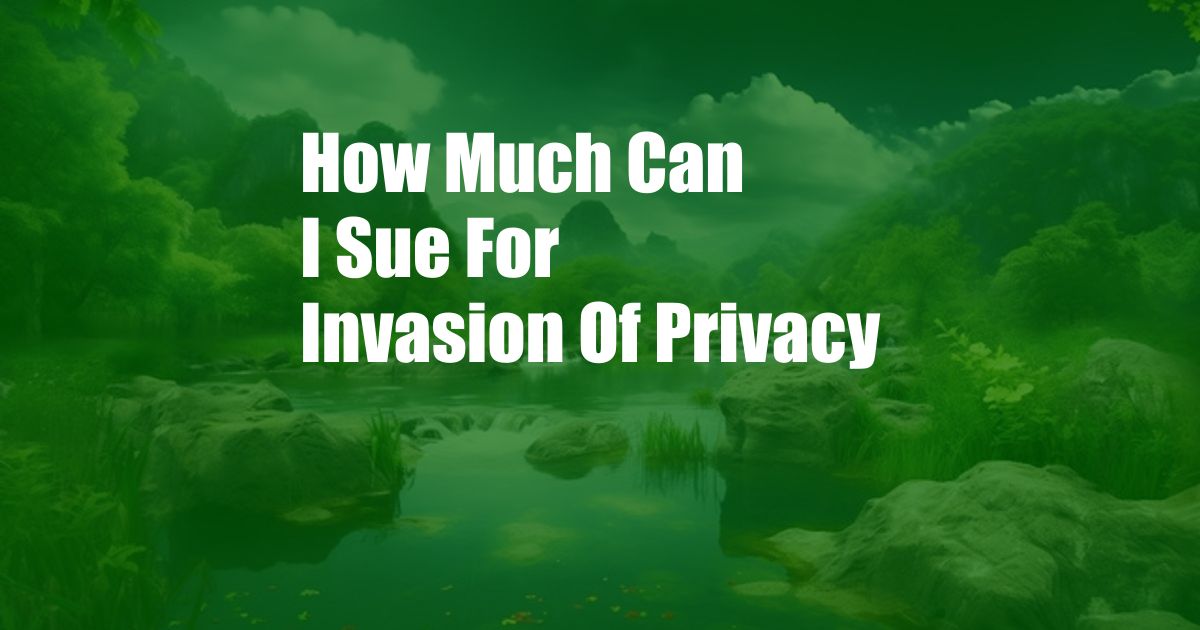
Know Your Rights: Understanding the Damages Recoverable for Invasion of Privacy
Invasion of privacy is a serious matter that can cause significant emotional distress and harm. If you have been the victim of such an act, you may be wondering how much you can sue for in damages. The amount you can recover will depend on a variety of factors, which we will discuss in this article.
Damages for Invasion of Privacy
Invasion of privacy can take many forms, such as public disclosure of private facts, intrusion upon seclusion, and misappropriation of likeness or identity. The damages you can recover will depend on the specific type of invasion and the harm it has caused you.
Compensatory Damages
Compensatory damages are awarded to compensate you for the actual losses you have suffered as a result of the invasion of privacy. These losses may include:
- Emotional distress
- Loss of reputation
- Loss of income
- Medical expenses
Punitive Damages
In some cases, you may also be awarded punitive damages. Punitive damages are intended to punish the defendant for their wrongful conduct and to deter them from committing similar acts in the future. Punitive damages are typically only awarded in cases where the defendant’s conduct was particularly egregious or malicious.
How to Determine the Amount of Damages
The amount of damages you can recover for invasion of privacy will vary depending on a number of factors, including:
- The severity of the invasion
- The intent of the defendant
- The harm you have suffered
- The financial resources of the defendant
Severity of the Invasion
The more serious the invasion of privacy, the more likely you are to be awarded a significant amount of damages. For example, if the defendant publicly disclosed your most intimate secrets, you are likely to be awarded more damages than if they simply took a picture of you in a public place.
Intent of the Defendant
The intent of the defendant is also a factor in determining the amount of damages you can recover. If the defendant acted with malicious intent, you are more likely to be awarded punitive damages.
Harm You Have Suffered
The amount of damages you can recover will also depend on the harm you have suffered as a result of the invasion of privacy. If you have suffered severe emotional distress or financial losses, you are likely to be awarded more damages than if you have suffered only minor harm.
Financial Resources of the Defendant
Finally, the financial resources of the defendant will also be considered in determining the amount of damages you can recover. If the defendant is wealthy, you are more likely to be awarded a substantial amount of damages.
Tips for Maximizing Your Recovery
If you are planning to sue for invasion of privacy, there are a few things you can do to maximize your recovery:
- Gather evidence: The more evidence you have to support your claim, the more likely you are to be successful. This evidence can include emails, text messages, social media posts, and witness statements.
- Get a medical evaluation: If you have suffered emotional distress as a result of the invasion of privacy, you should get a medical evaluation. This will help to document your injuries and provide support for your claim.
- Hire an experienced attorney: An experienced attorney can help you to build a strong case and negotiate a fair settlement.
FAQs About Invasion of Privacy Lawsuits
Q: What is the statute of limitations for filing an invasion of privacy lawsuit?
A: The statute of limitations for filing an invasion of privacy lawsuit varies from state to state. In general, you must file your lawsuit within two to four years of the date of the invasion of privacy.
Q: Can I sue for invasion of privacy if I am a public figure?
A: Yes, you can sue for invasion of privacy even if you are a public figure. However, the standard of proof is higher for public figures, meaning that you will need to prove that the defendant acted with actual malice.
Q: What are the defenses to an invasion of privacy lawsuit?
A: There are several defenses to an invasion of privacy lawsuit, including:
- Consent
- Newsworthiness
- Fair comment
- Privileged communication
Conclusion
Invasion of privacy is a serious matter that can cause significant harm. If you have been the victim of such an act, you should speak to an experienced attorney to learn about your rights and options. Are you interested in knowing how to sue for invasion of privacy?